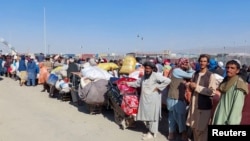Afghan Journalist Nasima Rawnaq's visa extension in Pakistan was rejected for the second time, and "no reasons [were] given for it," she said.
"Now, I do not know what to do," said Rawnaq, who fled to Pakistan in June. "I can't return to Afghanistan, as my life is in danger … and no relocation to a third country in sight."
Rawnaq is one of the hundreds of Afghan journalists who have escaped to Pakistan since the Taliban takeover of Kabul in August 2021, hoping to be relocated to a third country.
Now she and other Afghan journalists face deportation as the Pakistani government plans to begin deporting 1.7 million undocumented Afghans, including those "overstaying their visa validity periods."
On Oct. 3, Pakistani Interior Minister Sarfraz Bugti announced that all undocumented immigrants had until Nov. 1 to leave the country or face deportation.
Rawnaq said she will be considered "illegal" with no valid visa.
"I am afraid here as I was in Afghanistan. It is possible that I [will] get arrested and deported," said Rawnaq, who lives with her husband and child in Islamabad.
After Kabul fell to the Taliban, Rawnaq continued to work underground as a journalist, working nearly two years in Afghanistan at various media outlets.
"I was afraid whenever the door was knocked. I was thinking the Taliban were coming after me," she said. She finally decided earlier this year that she had to leave.
About 700,000 Afghans fled to Pakistan after the Taliban's takeover, according to the United Nations High Commissioner for Refugees.
UNHCR stated that 3.7 million Afghans live in Pakistan, of whom 1.7 million are deemed to be in the country illegally, with little or no protection or opportunity to apply for asylum.
'Very worried'
"All Afghans here in Pakistan are very worried, particularly those Afghans whose lives were in danger," said an Afghan journalist who requested anonymity for safety reasons.
He said about 200 Afghan journalists who fled the Taliban are currently in Pakistan and that most of them are hoping to be relocated to a third country.
He added that the exact number is not known "since they continue to flee to Pakistan and leave the country for relocation to other countries."
Since the Taliban takeover, journalists in Afghanistan face numerous challenges including censorship, violence and economic hardship, with women's voices silenced.
The journalist, who fled Afghanistan in recent months, told VOA that the international community should help in the relocation of these journalists, as "deporting them to Afghanistan could put them at great risk."
"The best way ahead would be to speed up the relocation processes," the journalist said.
Dozens of former U.S. officials and representatives of organizations who resettle Afghan refugees called on Pakistan to stop deporting those who fled the Taliban.
'Becoming difficult'
Afghan journalist Marzia Hafizi, who was evacuated alongside her mother and five sisters to Pakistan in 2022, told VOA that they face uncertainty as there is "no progress" in their cases.
"I am losing hope, and I do not know whether we would be relocated to a third country or not," said Hafizi, who said she fled Afghanistan because of threats.
Hafizi, who now works in Pakistan with a transborder TV station, told VOA that the decision to deport Afghan refugees is making their lives "even more difficult."
Hafizi said that because of her 13 years of media work, including with TOLOnews, she faces threats in Afghanistan if she returns.
But she said it is becoming difficult to live in Pakistan, and she had to curtail her outdoor activities.
"I was going to the nearby park daily to walk, but for the last two to three months, I stopped going there, as I am afraid that the police might arrest me," Hafizi said.
She said the owners of the house where she lives have been told not to rent their houses to Afghan refugees who do not have documents or valid visas.
"A few days ago, the owner of the house where we live on rent called and told me that you should have valid visas or else you should vacate the place," Hafizi said.
In a statement released on Tuesday, Human Rights Watch said, "The Pakistani government is using threats, abuse and detention to coerce Afghan asylum-seekers without legal status to return to Afghanistan or face deportation."
The Pakistani government has rejected calls for it to suspend the deportation plan.





